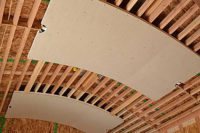
Having just returned with a relief team from Gulfport, MS, I witnessed an equally daunting challenge. There is an enormous volume of people living in homes that eventually could be condemned if repairs are not made soon. Most are low-income people who do not have the resources for even modest repairs. Many are elderly or in poor health.
The amount of physical damage is overwhelming. Nearly every building in Gulfport and nearby communities has sustained substantial damage. Those who were able tarped their roofs and walls to cover the gaping holes. Those without resources are relying on teams like the one I joined to deliver, and in some cases install, tarps for them. Our team provided about 300 tarps.

Another problem facing homeowners is living with unsafe appliances and power sources. Wind and water have left water heaters, ranges, air conditioners, and electric supply lines in questionable condition. Similarly, damaged plumbing lines may leave homeowners susceptible to leaks, sewage backups, and tainted water.
Some homeowners with insurance are stuck in a “Catch 22” situation. They have been told by their insurance companies their roofs will be covered by their policies, but damage that takes place inside the home after Katrina may not be covered. If the insurance companies write checks immediately, it could take a year before homeowners get contractors to make repairs. Even with an excellent tarp job, it will be difficult to stave off the wind, rain and insects that will damage drywall, plaster, wood and insulation.
Hope Is In the Air
To get to Gulfport, our team drove across I-10 from Alabama into Mississippi. It's a slow drive because the eastbound bridge was knocked out by a barge. But that logjam gave us a chance to see who was stuck with us. It was inspiring. A huge army has descended upon the Gulf Coast. They've come from every corner of the country loaded with supplies, machinery, volunteers and hope. One of my crewmates likened it to a massive ant colony whose hill was wrecked, but mobilizes with massive intensity to rebuild.
The mood in Gulfport and nearby communities is surprisingly upbeat. There is no anger or finger pointing. We spoke with scores of residents and all were thankful to be alive and for whatever supplies and help we provided. We got lots of hugs from grateful residents. In one community where we distributed food, juice and hygiene items we ran into another church-based relief group like ours. It was uplifting to know that so much help is pouring in that we were starting to overlap.
Countless local organizations are taking the lead in meeting their communities' needs. Seemingly every other church was being used as a relief distribution center with workers and supplies covering their parking lots and, in some cases, tents and campers parked on their lawns. This help is offered despite damage to their own buildings and grounds.In addition to church teams, Red Cross, FEMA, the National Guard and law enforcement personnel were highly visible. A strong sense of community is in place. Groups are sharing resources and helping each other. We're all working toward the same goal.
And yet, the needs will be ongoing. Our team brought a loaded semi and distributed about half of the supplies over two days. Other teams will distribute the remainder. Supplies and volunteers will be needed for months.
What's a Tradesperson to do?
If you've read this far, it is likely you are wondering how you can help. Lots of groups already are collecting and distributing supplies. Utilities are largely reconnected. Quality repair work is now a top priority and will be for years.
If you are a business owner, consider sponsoring a team from the skilled trades to go to the Gulf Coast region. Minimally, support your employees who volunteer for such duty.
If you are in a skilled trade, look for an opportunity to join a work team headed to the region. Partner with local groups who can direct you to homeowners without insurance or simply in great need. Bring building supplies if possible. As of mid-September, local contractors told me they were not experiencing materials shortages. However, the National Association of Home Builders is predicting shortages of plywood, lumber, and cement. Roofing and exterior cladding materials have been in tight supply since last year's hurricanes pounded Florida.
Perhaps you are looking for a business opportunity. There is a burgeoning need in the region for ethical contractors to repair roofs, walls, insulation, plumbing, HVAC, electrical, appliances, flooring and cleaning/restoration. There is an unlimited pool of potential workers who desperately need jobs. You may need to get licensed in those states and provide training, but that would be a solid investment in your future. Best of all, you just might get a hug for your efforts.



